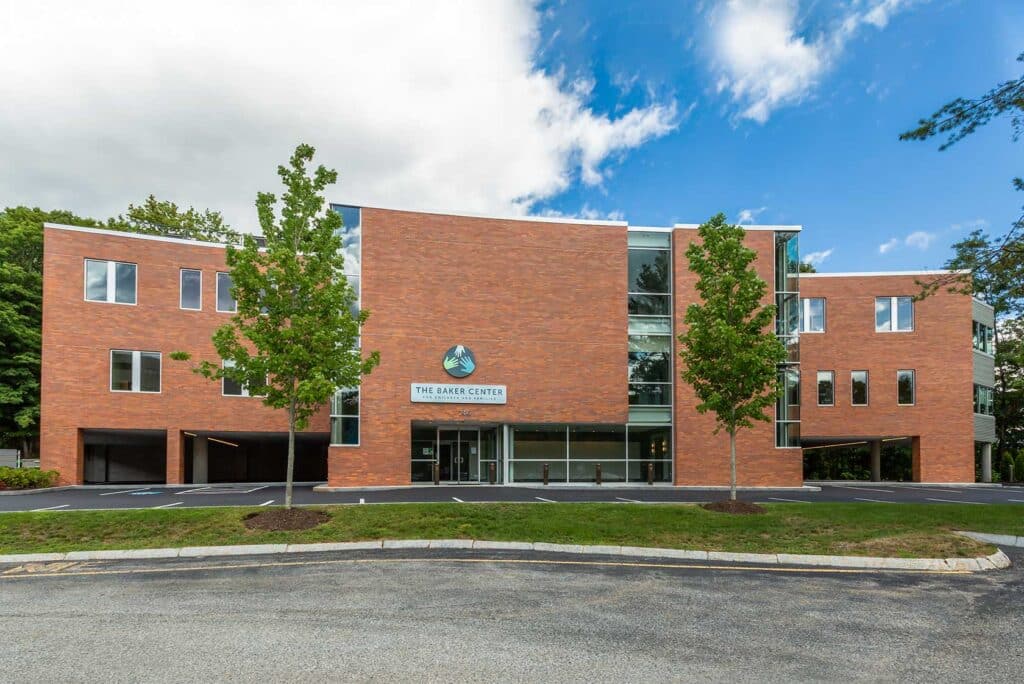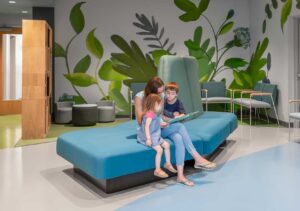
Patricia Oduah thought her experience as a clinician and social worker would leave her prepared to parent kids coming out of the foster care system.
But when she and her husband welcomed three siblings from foster care, the experience proved more challenging than expected.
The oldest of her three children, a 5-year-old at the time, started displaying behavioral issues with a lot of aggression and PTSD symptoms. He struggled to manage his behaviors and had trouble at school.
“Myself being a clinician, you know, I thought I was prepared to manage and deal with children who came from the foster care system, but this was more than what I could handle and knew,” Oduah said.
But she said work with the Center for Effective Therapy at the Baker Center for Children and Families led to dramatic results. After just one year of treatment, she said, he was a different kid.
“He’s still at the same school that he was at when he was having those behaviors and the teachers would say, ‘If we didn’t know his story, if we hadn’t seen this before, we would just tell you that this isn’t real,’” said Oduah, whose middle child later went through the center as well.
The program, which is offered to young people from the ages of 2 to 22, uses what the Baker Center bills as “short-term, high-quality, evidence-based treatments” — a range of approaches that Meghan Geary, a senior clinician with the Center for Effective Therapy, said is designed to get families results fast.
“It’s really special, in the fact that we can get a lot of children, teens and families served and in and out of treatment rather quickly and really change lives on a scale that is pretty impressive,” Geary said.

A family in the waiting room of the Center for Effective Therapy. PHOTO: THE BAKER CENTER FOR CHILDREN & FAMILIES
Those approaches include techniques like cognitive behavioral therapy and trauma-informed cognitive behavioral therapy, parent-child interaction therapy and behavioral parent training — methods that Geary said have been researched through clinical trials and can show fast results. That’s in contrast, she said, to some other providers who might engage in treatments that are also effective but may take longer.
“We’re really focused on the most impactful, bang-for-your-buck intervention so kids and families aren’t just hanging out in treatment for years,” Geary said. “We want them to go back to living their lives.”
That process, and the relatively quick timeline, makes for an intensive process, but Oduah said it was one that yields bold results.
“You don’t have to sit there and wonder, ‘Are we doing this for another five years? 10 years?’” she said. “You know this is a treatment target timeline, and you know that it’s going to work, and it works.”
And for Oduah, that time flew. She said that the end of her oldest child’s year of treatment snuck up on her. When he finished, she almost felt like she wasn’t ready for the sessions to end.
“But I knew that it was a very specific trauma-informed therapy, that it wasn’t like a lifelong thing but it was something targeted that they were working towards to help,” Oduah said. “Once we saw those behaviors modified and changed, and we developed the coping skills, and he developed coping skills, we were ready to go.”
That work is intended to not just help the kids going through the program, but the parents as well.
When her oldest child started working with the Baker Center, Oduah said she expected the program to be focused on helping him develop new skills. Throughout the process, however, her viewpoint shifted.
“It wasn’t so much about changing them; once I started working with the Baker Center, it was more sort of changing our ways as well, on how to communicate with our children,” she said.
Geary said one goal for the Center is accessibility. Appointments are offered on a sliding scale or are covered by some insurance providers — Geary said the Baker Center has been working to expand which they can accept — all with the goal of making sure as many people as possible can access the care.
“We don’t want people to not get therapy or treatment because they can’t afford it,” she said. “That’s not ok.”
It’s part of a vision, Geary said, of trying to make sure that mental health treatments can reach more communities.
“Mental health doesn’t discriminate; it’s a concern across all populations,” Geary said.
That accessibility was a boon for Oduah, who said that part way through treatment for her eldest child, her hours at work shifted. With money tighter, the Baker Center worked with her to adjust the treatment costs to make sure that her son could continue receiving care.
“They were able to help me to still continue services at a rate that was comfortable to me and my family, rather than saying, ‘Sorry, we’ve got to end services because you can’t [pay],’” she said.
Oduah said those impacts have been lasting, and a point of pride to celebrate.
At the end of the program, the Center for Effective Therapy runs a graduation celebration for each participant. For Oduah’s kids, this marked a joyous recognition of the work they put into getting better.
She said that the celebrations had a certificate, and they brought balloons and cake to mark the occasion.
The certificate now hangs on the family’s “Wall of Fame” in their home.
“He sees it, and he’s like, ‘Yeah, I did that,’” she said. “It gave him a sense of identity, autonomy, like, ‘I did this, I went to therapy, I accomplished these tools.’ It was really, really nice and it was nice for us to see the growth that he did but also be able to tell him how proud we were at that moment.”






